Interviews
Interview with Janusz Gołuchowski
Interview conducted in Warsaw, 2016.
Let me give you a piece of advice, dear Readers: always have eyes in the back of your head! Otherwise you may not pay attention to a noteworthy passer-by.
Lost in Żoliborz, a Warsaw district that I don't know well, I was lucky to notice Major Gołuchowski. Having seen him within a walking distance of the underground station, I knew at once he was a good man, a dignified gentleman. He seemed to be an answer to the question from my favourite song, "Gdzie są chłopcy z tamtych lat?" ("Where have all the flowers gone?")I asked him the way but was given much more: a piece of Major's life story. I heard its details during the interview. Isn't it true that our contemporaries long for authorities in order not to lose faith in the values cherished by those living in the past?
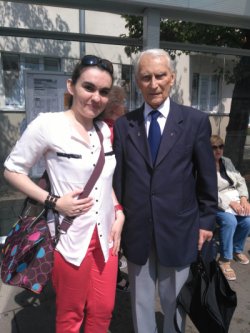
Warsaw, August 1, 2016
Many thanks for your time and kindness, Major! I recommend all of our website's visitors reading the interview from the bottom of my heart.
Monika Ałasa
1. M.A.: On your lapel I can see two badges. One of them is Kotwica (the Anchor), the symbol of the Polish Underground State. You have told me that on your uniform jacket there are more marks of distinction. Could you please explain the meaning of each?
J.G.: My jacket has got two lapels on which there are six badges altogether. Let's start from the left lapel: you can see here the following:
- a golden medal of merit for the 1st Armored Division,
- a badge of Veteran of Struggles for Independence,
- the Anchor - a symbol of Fighting Poland.
On the right lapel, however, one can see:
- a badge of the Polish Armed Forces in the West,
- a memorial badge given by HM Queen Elisabeth II at the ceremony in London in the year 2005 in which representatives of soldiers of the Polish Armed Forces in the West participated holding their banners,
- the British veteran's badge.
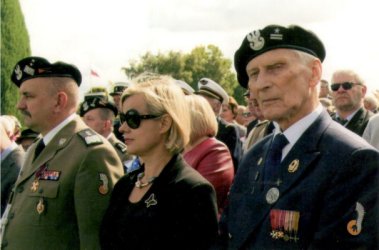
August 2014, Normandy, Ceremonye 1st Armored Division cemetery in Urville Langanerie.
Standing from the left: Major general Jarosław Mika, Commander of 11th Armored Cavalry Division,
Ms. Bożena Żelazowska, Deputy Minister of Council of War Veterans and Victims of Oppression,
Major Janusz Gołuchowski, Chairman of the Warsaw Association of the 1st Polish Armored Division
2. M.A.: What did affiliation to the Polish Underground State mean to you?
J.G.: I have always considered being a Home Army soldier both duty and honour.
3. M.A.: I suppose not many Warsaw Insurgents can say of themselves, "I used to serve in the 1st Armored Division of General Maczek", or am I wrong?
J.G.: In fact, there was a little group of several dozen people.
4. M.A.: Please explain what you mean saying -quite often- "I've got a torn heart"?
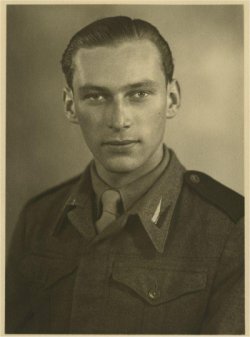
Janusz Gołuchowski, 1945.
J.G.: I understand it in such a way that immensely important is to be a Home Army soldier and to be a 1st Armored Division soldier is not less important.
5. M.A.: Let's put the facts straight. What's the chronology of your combat fate?
J.G.: First the Home Army, the Warsaw Uprising, then the German camp, the Polish Military camp and the 1st Armored Division.
6. M.A.: The Polish people living contemporarily, while hearing a surname of General Maczek, probably think of the ethos of the legendary commander. What do you feel on hearing General Stanisław Maczek?
J.G.: He was truly a magnificent commander and an ingenious strategist who had never lost any battle, the legendary "Baca", loved by his soldiers, an amiable man, indeed.
7. M.A.: Since when had your fate been connected with the 1st Armored Division?
J.G.: After the end of warfare, having stayed in the Military camp, I was officially relocated to the 1st Armored Division in January 1946, at the time when the Division had been occupying the western part of Germany a.k.a. Friesland, until the demobilization, i.e. August 1947.
8. M.A.: I know you used to be a scrivener for 10 years while for 12 years you have performed duties as the Chairman of the Warsaw Association of the 1st Polish Armored Division. What are your tasks?
J.G.: I conduct routine tasks of a chairman but also, if needed, I am responsible for representing our community among the Allied countries both in Poland and abroad. We deal with organizing numerous ceremonies in Poland, the feast of the 1st Armored Division, in particular.
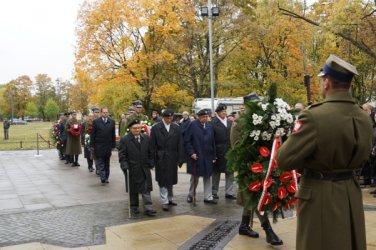
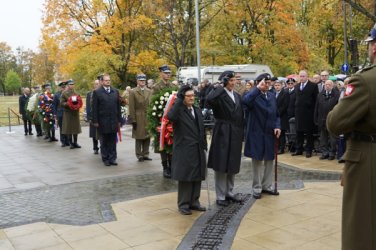
Ceremony on the occasion of the Feast of 1st Armored Division, October 8, 2016, Warsaw
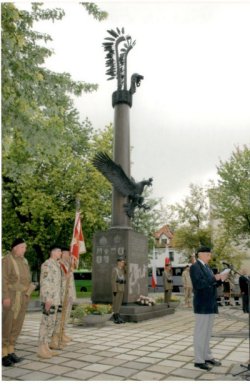
The Memorial of the 1st Armored Division, Plac Inwalidów, Warsaw
9. M.A.: Major, how would you compare the generation of today's twenty- and thirty-year-olds with your own generation? While observing your grandchildren and their friends do you believe they "would behave properly"?
J.G.: It is quite difficult to currently compare these two generations. Nevertheless, I am sure that "present Columbuses" would behave like their ancestors did.
10. M.A.: What is your advice for those who long for the world that was once created by the Columbus Generation (the Polish people who were born about the year 1920 - M.A.)?
J.G.: I could only advise them to reach the history sources and make themselves acquainted with heroic deeds of the Columbus Generation, which is my generation.
11. M.A.: Which of numerous books, films and TV series would you recommend a person who is willing to broaden their mind and enhance their patriotic spirit?
J.G.: The unchangeable and always worth recommending literary production is "Kamienie na szaniec" (written by Aleksander Kamiński - M.A.) and as far as the film production is concerned: "Kolumbowie" (directed by Janusz Morgenstern it is the adaptation of two first volumes of "Kolumbowie rocznik 20" written by Roman Bratny - M.A.).
12. M.A.: Let's come back to the heroic days of the Warsaw Uprising. Could you tell me about one particular moment that is unforgettable, always vivid in your memory and heart?
J.G.: Crossing through the sewers was the most tragic event every time.
13. M.A.: In which district of Warsaw did you find yourself at the W hour? Was it Żoliborz, where you are living presently?
J.G.: No, it was not. Two days before the Uprising outbreak we ("Obroża" group) were staying at the area of the present district of Białołęka.
14. M.A.: Were you armed? If so, what kind of weapon would you carry then? How about your friends?
J.G.: Not everybody was. Only few of us had a gun and the others, mind you, owned nothing but self-made grenades, known as "filipinki"!
15.M.A.: Were the poems written by Krzysztof Kamil Baczyński or Tadeusz Gajcy popular among the Insurgents? Would you sing the songs which we presently sing not only on August 1?
J.G.: Personally, I had never heard any of the songs which are being sung nowadays.
16. M.A.: Could you now describe shortly the Uprising route of your unit (battalion)?
J.G.: The 6th troop, to which I belonged, was part of II Battalion. It was intended - as well as other troops but I don't know which exactly and how many - to attack the German barracks in Legionowo, nearby Warsaw. Our aim was to gain weapon. We were marching the whole night in a pouring rain, at the forest verge, along the railway track, on which a German armored train used to locomote. The forest from the southern side would reach the city. It started to dawn when we approached the city and then soldiers in German tanks attacked us. All hell broke loose. We started to retreat. The thick forest saved us. Nobody lost their life but there were a few wounded men. Till now I have no idea how it was possible. How come Germans knew of our presence there?
When, at the break of day we backed away to the first buildings, we met our commanders. In this critical situation they ordered us to wait for further commands. When in the morning I came to my outpost I was rain-soaked and cold. The only thing I could do was go to bed. Consequently, I fell ill. I suffered from pneumonia and stayed in bed. At this time my troop crossed over the Vistula river and reached the Kampinos Forest where there had been buildup of other troops that came to Warsaw's aid from the side of Żoliborz. Together with my mate I was in hiding in a yeast factory. Finally, Germans caught us but not earlier that after the fall of the Uprising, i.e. on October 2. They imprisoned us for two weeks in the Zakroczymska Fortress, and from there they transported us away to the camp in Germany in which we were imprisoned as "Banditen von Warschau" ("Bandites from Warsaw"). In such an inglorious way my Uprising finished.
The camp was situated in the Harz mountains from where Americans liberated me on April 16, 1945.
After the liberation I found myself in the Polish Military camp, from where - as I have said before - I was officially relocated to the 1st Armored Division.
17. M.A.: For 12 years each Warsaw Uprising Anniversary has been annually celebrated in Warsaw. The opening of the Museum in the Grzybowska street, which took place on the 60th anniversary of the Uprising outbreak due to the late Mr. President Lech Kaczyński, is now seen as inspiration for many. How was the day of August 1 celebrated in the dark post-war time when love to our Homeland meant prison, persecution, death?
J.G.: At first there were individual, unarranged visits at the insurgents' graves. Then they became more and more organized. But not earlier than after the transformation in the year 1989, all became official and fully arranged.
18. M.A.: Were you persecuted by the communist authorities for your participation in the Uprising and being a Home Army soldier?
J.G.: No! It seems a bit strange but let me explain. When -after the demobilization- I came back to my homeland, which was on August 15, 1947, I was wearing a divisional uniform, of course. While I was being registered by the Polish repatriation authorities, I didn't admit to have been a Home Army soldier, a participant of the Warsaw Uprising. Due to my young age - I was 19 at the time - they believed me with no doubts. If I had admitted, I would have been transported away to Siberia for hard labors. It was certain, as eggs is eggs, and the pleasure to meet you would never be mine.
It does not mean, though, that repressions by the Secret Political Police had never been passed on to me. I was being questioned by them for half a year. I was accused of spying, sabotage and subversive activity so I was called "zapluty karzeł reakcji" (the disdainful name of Home Army soldiers used by the communists in the post-war Poland - M.A.), etc.
It was impossible for a long time to get a job. I also had difficulties to take up studies as the certificate of my having graduated from the second class of secondary school - the one named after the First Armoured Division in Quackenbrück - had the eagle with a crown printed on.
19. M.A.: I do think that your family could have been an archetype of Warsaw families, the inmates of a tenement-house in the Złota street number 25 in the TV series "Dom" directed by Jan Łomnicki. Can you notice such affection to the Capital city, to one's district among contemporary Warsaw residents?
J.G.: This is how my further family life looked like. Despite all those adversities, I was learning and working simultanously. I graduated from the secondary technical school of industrial construction. Meanwhile, I got married. My wife Alicja, also while working, graduated from the secondary technical school of foreign trade. Then she worked in foreign trade corporations whereas I, naturally, in construction field. My wife passed away in the year 2005, due to cerebral hemorrhage, at the age of 77. Our daughter Iwona worked in institutes, mainly in "Megadex" as an economist while our son Jarosław-Maria as a specialist in the car industry, deals with car transport and works mainly abroad.
I have a 5-year-younger sister Maria, who had worked in the Polish Radio through whole her life, as an editor of "The Radio Calendar".
The oldest grandson Kuba is an IT specialist, and works in the insurance company; his sister is an economist, having graduated from studies, she is bringing up my two great-grandchildren: Antoś (6 years old) and Ignaś (5 years old).
My second grandson Kamil, an economist, works in TVN and has got a 5-year-old daughter Karolina, a pre-school dancer, who is a smartie, indeed, supposedly alike her mummy who is your namesake Monika and is a double-graduate.
My mother Lucyna has never worked professionally; as a housewife, she was looking after children, whereas my father Józef was an owner of two hairdresser's salons but passed away at the age of 42, on the day of my 16th birthday, which was four months before the Uprising. So I came back to nothing, which means both salons had not existed anymore and our flat had been plundered; Mum cleaned it a bit but, to tell you the truth, we had to start our life from the very beginning.
20. M.A.: Your date and place of birth are…
J.G.: March 4, 1928, Warsaw.
21. M.A.: What are your private interests, Sir?
J.G.: I love nature, my passion is sport. I bought a garden plot (1200 square meters), by the Narwia river, nearby Pułtusk. It neighbours a big wood. I built a chalet there (3 rooms and a kitchen) and that's the place where I spend summer months, trying to look after this place as well as I can and I must admit there is much to do. Till recently, I used to practice jogging in the wood, but time flies and I have to slow down. However, my habits from the times when I used to run sprints in the Legia club have remained, and presently in the morning I do exercises, which makes me keep a good health condition.
I also enjoy mountains, especially in winter. I used to ski. When I was younger, I used to canoe in the Mazuria lake district, in the Puszcza Piska lakes and the Krutynia river.
I am an opera lover. It was a close thing for me, mind you, to become a singer, on the ad vice of my uncle, a the first instrumentalist of the Representative Artistic Ensemble of the Polish Armed Forces. Nowadays, I keep singing to myself. Not long ago I was being persuaded to accompany her in singing by Mrs. Magda Kunce, a resident of Warsaw, who presently works in Lublin and has a beautiful soprano voice.
22. M.A.: Am I likely to meet you at the stand of the stadium in the Łazienkowska street? Are you and your near and dear the supporters of Legia Warsaw football club?
J.G.: You could meet me there in the past but not nowadays. I am afraid I could be hit with a bottle or a rotten tomato. But yes… there was a time when I used to participate in matches as a fan, together with my little daughter. It was indeed a different time. My grandson Kamil, though, is a Legia Warsaw supporter. Yet, not a hooligan!
23. M.A.: Well, since the year 2005 I have been a member of the 1944 Warsaw Uprising Remembrance Association. Its activity can be followed on this website. Major, can I ask you to raise our, i.e. the Board's and Members', spirits? Do you think that our volunteer activity is sensible or conversely - can it be called simple-mindedness?
J.G.: To tell you the truth, I had never heard of the Warsaw Uprising Remembrance Association. The reason may be that I do not use the Internet, although I have had the access only recently. That is why I stand in absolute awe of what I hear of the Association members. I do appreciate your activity, especially the one of people who live outside Warsaw. Having got to know from you about what you do, I was dumbstruck.
I would not even think about calling your interest of the Warsaw Uprising simple-mindedness. Quite the opposite - I define it as an upstanding activity filled with the feeling of patriotism and glory of the Polish Arms. As far as I'm concerned, I estimate it as the highest kind of patriotism in peacetime. Well done!
24. M.A.: Could you make mention of at least few persons from the world of government, diplomacy, culture and defenses who you met in person?
J.G.: There are lots of such people. Let me first cast my mind back to the year 1994, i.e. the 50th anniversary of the Allies' landing on the European continent, which meant joining the warfare by the 1st Polish Armoured Division on August 8, 1944 at Caen followed by further successes in the Falaise and Chambois battles, as well as the Mont Ormel battle called "The Mace" by General Maczek. The latter was a four-day-long bloody armoured battle finished with a resounding victory. In Poland the first grand celebration of this victory was organized in August 1995, with the participation of both French and Polish presidents: Francois Mitterand and Lech Wałęsa, accompanied by a numerous Polish deputation of the 1st Armoured Division soldiers. The main celebration took place in the largest Polish War Cemetery in Normandy, in Urville-Langannerie. The presidents got there by means of helicopters.
The Representative Artistic Ensemble and the Company of the Polish Armed Forces participated in the celebration. The choir from Warsaw called "The Harp" performed then.
I was appointed the first banner representative of the 1st Armoured Division and, thanks to the fact that our banner appeared grandly, we were being invited to various official ceremonies. Consequently, I assisted in the laying a wreath at the Unknown Soldier Tomb by the Dutch Queen Beatrix as well as the British Queen Elisabeth II. After the ceremony both Queens approached me and talked to me in English for a while. I had a photograph taken with Queen Beatrix. Yet, we were forbidden to take pictures with Queen Elisabeth II.
I had the occasion to converse with Queen Beatrix twice more during the ceremonies in Breda. She remembered our previous meetings.
Later, having been the Chairman of the Warsaw Association of the 1st Polish Armoured Division, I was officially introduced to the French Prime Minister during the meeting in the Victoria hotel.
Similarly, I was honoured to meet the Canadian Prime Minister and few minister from France, Holland and Belgium as they were visiting Poland.
In April 2010 at the Royal Castle I talked to the British Prince Charles, during his stay in Warsaw, while in autumn I met Prince Edward, the occasion of which was conveying Polish memorabilia in the Polish Army Museum.
Invited by the Ambassador Mr. Robin Barnett, I accompanied the British Prime Minister in the laying a wreath at the Unknown Soldier Tomb on December 10, 2015. After the ceremony we made a long private conversation, captured on photographs.
Another remarkable event on June 24 and 25, 2014 was a visit of the King of the Netherlands Willem Alexander with his wife Queen Maxima in Poland, including Warsaw. The King wished for a meeting with veterans of the 1st Armoured Division by its monument at Plac Inwalidów in Warsaw. My eight friends participated in the conversation. Having been a host, I showed the Royal couple around the monument. I had been invited to a banquet given in the evening by President Komorowski in the Palace in honour of the Royal couple. The next day I was honoured to talk to Queen Maxima on the Old Orangery patio. A month later, via diplomatic post, I received the photograph of the Royal couple, taken at the King Coronation, with the authentic autographs of both King and Queen, which was confirmed by a special note.
On October 13-15, 2015 the Belgian Royal couple - King Philip and his wife Queen Matilda, de domo Komorowska - stayed in Poland. Asked by the Ambassador Mrs. Colette Taquet, I took part in the Deception ceremony of the Royal coupe and was honoured to talk to Queen Matilda. The photograph taken during this conversation was published in a monthly "The Ambassador".
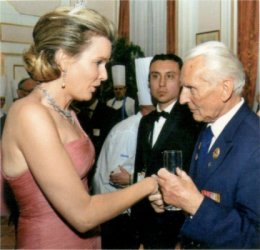
Major Janusz Gołuchowski, the Chairman of the Warsaw Association of the 1st Polish Armoured Division,
was honoured to converse with Her Majesty the Queen Matilda
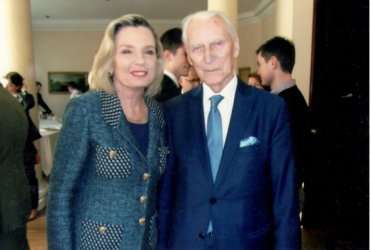
March 2016, the Residence of the British Ambassador, with Mrs. Anna Maria Anders
25. M.A.: What is your next destination?
J.G.: I'm going to Bydgoszcz to participate in the ceremony of the 70th anniversary of the Educational Care Centre for deaf and hearing-impaired children, that have been named after General Stanisław Maczek. No doubts it's going to be a beautiful ceremony.
M.A.: Let me congratulate you on your activity and participation in numerous official ceremonies whether in Poland or abroad. Let me also express my admiration and gratitude due to your proper representing our Homeland. I wish you the best of health. May you always be an example to follow in your good activities!
J.G.: Thank you for your good wishes.
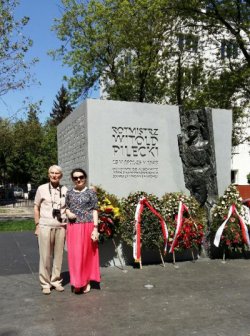
Żoliborz, May 20, 2017
Warsaw, December 12, 2016
compiled by: Monika Ałasa
elaborated by: Maciej Janaszek-Seydlitz
translated by: Monika Ałasa
Copyright © 2017 SPPW1944. All rigths reserved.








